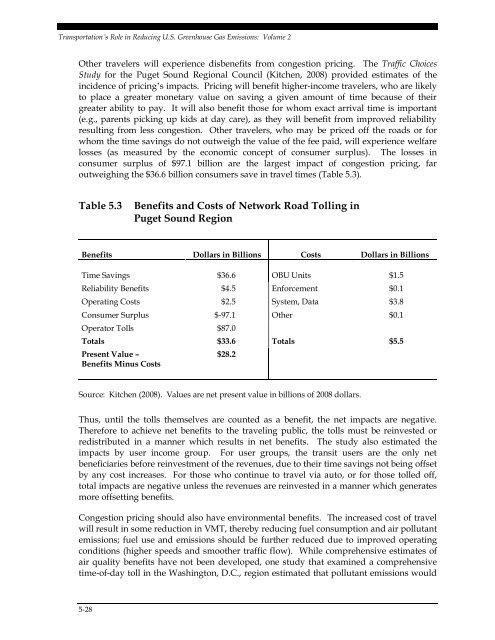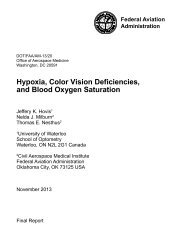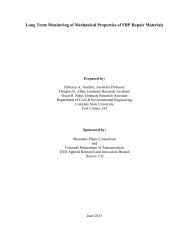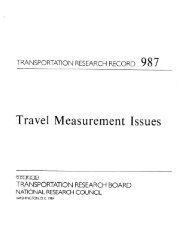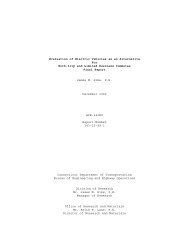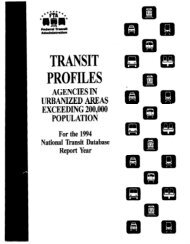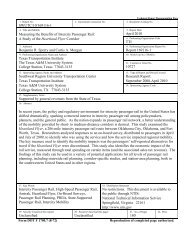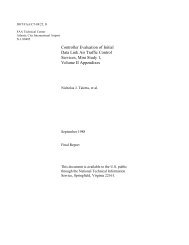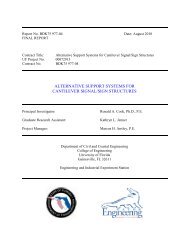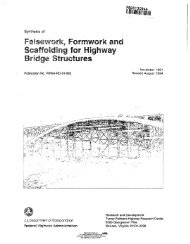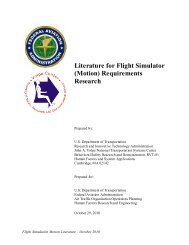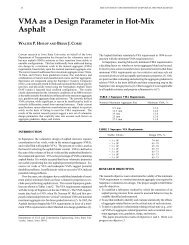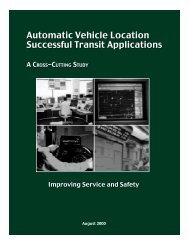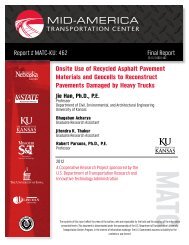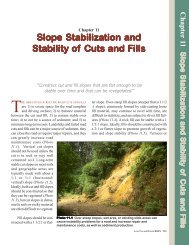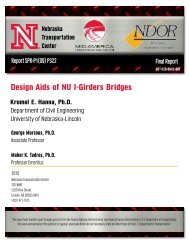- Page 7:
Acknowledgments Transportation's Ro
- Page 11:
Table of Contents Transportation's
- Page 15:
List of Figures Transportation's Ro
- Page 18 and 19:
Transportation's Role in Reducing U
- Page 20 and 21:
Transportation's Role in Reducing U
- Page 22 and 23:
Transportation's Role in Reducing U
- Page 24 and 25:
Transportation's Role in Reducing U
- Page 26 and 27:
Transportation's Role in Reducing U
- Page 29 and 30:
1.0 Introduction Transportation's R
- Page 31 and 32:
Transportation's Role in Reducing U
- Page 33 and 34:
Transportation's Role in Reducing U
- Page 35 and 36:
Transportation's Role in Reducing U
- Page 37 and 38:
Transportation's Role in Reducing U
- Page 39 and 40:
Transportation's Role in Reducing U
- Page 41 and 42:
Transportation's Role in Reducing U
- Page 43 and 44:
Transportation's Role in Reducing U
- Page 45 and 46:
Transportation's Role in Reducing U
- Page 47 and 48:
Transportation's Role in Reducing U
- Page 49 and 50:
Transportation's Role in Reducing U
- Page 51 and 52:
Transportation's Role in Reducing U
- Page 53 and 54:
Transportation's Role in Reducing U
- Page 55 and 56:
Transportation's Role in Reducing U
- Page 57 and 58:
Transportation's Role in Reducing U
- Page 59 and 60:
Transportation's Role in Reducing U
- Page 61 and 62:
Transportation's Role in Reducing U
- Page 63 and 64:
Transportation's Role in Reducing U
- Page 65 and 66:
Transportation's Role in Reducing U
- Page 67 and 68:
Transportation's Role in Reducing U
- Page 69 and 70:
Transportation's Role in Reducing U
- Page 71 and 72:
Transportation's Role in Reducing U
- Page 73 and 74:
Induced Travel Demand Transportatio
- Page 75 and 76:
Transportation's Role in Reducing U
- Page 77 and 78:
Transportation's Role in Reducing U
- Page 79 and 80:
Transportation's Role in Reducing U
- Page 81 and 82:
Transportation's Role in Reducing U
- Page 83 and 84:
Transportation's Role in Reducing U
- Page 85 and 86:
Transportation's Role in Reducing U
- Page 87 and 88:
Transportation's Role in Reducing U
- Page 89 and 90:
3.11 SUMMARY OF FINDINGS Transporta
- Page 91 and 92:
Transportation's Role in Reducing U
- Page 93 and 94:
Table 3.5 Findings by Strategy: Sys
- Page 95:
Strategy Name Travel Activity Commu
- Page 98 and 99:
Transportation's Role in Reducing U
- Page 100 and 101:
Transportation's Role in Reducing U
- Page 102 and 103:
Transportation's Role in Reducing U
- Page 104 and 105:
Transportation's Role in Reducing U
- Page 106 and 107:
Transportation's Role in Reducing U
- Page 108 and 109:
Transportation's Role in Reducing U
- Page 110 and 111:
Transportation's Role in Reducing U
- Page 112 and 113:
Transportation's Role in Reducing U
- Page 114 and 115:
Transportation's Role in Reducing U
- Page 116 and 117:
Transportation's Role in Reducing U
- Page 118 and 119:
Transportation's Role in Reducing U
- Page 120 and 121:
Transportation's Role in Reducing U
- Page 122 and 123:
Transportation's Role in Reducing U
- Page 124 and 125:
Transportation's Role in Reducing U
- Page 126 and 127:
Transportation's Role in Reducing U
- Page 128 and 129:
Transportation's Role in Reducing U
- Page 130 and 131:
Transportation's Role in Reducing U
- Page 132 and 133:
Transportation's Role in Reducing U
- Page 134 and 135:
Transportation's Role in Reducing U
- Page 136 and 137:
Transportation's Role in Reducing U
- Page 138 and 139:
Transportation's Role in Reducing U
- Page 140 and 141:
Transportation's Role in Reducing U
- Page 143 and 144:
6.0 Conclusion Transportation's Rol
- Page 146:
Printed on paper containing recycle
- Page 149 and 150:
Transportation’s Role in Reducing
- Page 151 and 152:
1.0 Introduction Transportation’s
- Page 153 and 154:
2.0 Low-Carbon Fuels Table of Conte
- Page 155 and 156:
List of Tables Transportation’s R
- Page 157 and 158:
� 2.1 Summary Overview of Low-Car
- Page 159 and 160:
Transportation’s Role in Reducing
- Page 161 and 162:
Transportation’s Role in Reducing
- Page 163 and 164:
Transportation’s Role in Reducing
- Page 165 and 166:
Transportation’s Role in Reducing
- Page 167 and 168:
Transportation’s Role in Reducing
- Page 169 and 170:
Transportation’s Role in Reducing
- Page 171 and 172:
Transportation’s Role in Reducing
- Page 173 and 174:
Effects on Infrastructure Funding T
- Page 175 and 176:
Transportation’s Role in Reducing
- Page 177 and 178:
Tax and tariff policy also can affe
- Page 179 and 180:
Transportation’s Role in Reducing
- Page 181 and 182:
In 2006, approximately 43,000 mediu
- Page 183 and 184:
Market Penetration Transportation
- Page 185 and 186:
Transportation’s Role in Reducing
- Page 187 and 188:
Transportation’s Role in Reducing
- Page 189 and 190:
� 2.5 Liquefied Petroleum Gas (LP
- Page 191 and 192:
Transportation’s Role in Reducing
- Page 193 and 194:
Transportation’s Role in Reducing
- Page 195 and 196:
Transportation’s Role in Reducing
- Page 197 and 198:
Transportation’s Role in Reducing
- Page 199 and 200:
Transportation’s Role in Reducing
- Page 201 and 202:
Transportation’s Role in Reducing
- Page 203 and 204:
Transportation’s Role in Reducing
- Page 205 and 206:
Transportation’s Role in Reducing
- Page 207 and 208:
Transportation’s Role in Reducing
- Page 209 and 210:
Transportation’s Role in Reducing
- Page 211 and 212:
Transportation’s Role in Reducing
- Page 213 and 214:
Transportation’s Role in Reducing
- Page 215 and 216:
Development of a Hydrogen Infrastru
- Page 217 and 218:
� 2.9 Electricity Overview Many o
- Page 219 and 220:
Transportation’s Role in Reducing
- Page 221 and 222:
Transportation’s Role in Reducing
- Page 223 and 224:
Transportation’s Role in Reducing
- Page 225 and 226:
Transportation’s Role in Reducing
- Page 227 and 228:
Feasibility Transportation’s Role
- Page 229 and 230:
� 2.10 References Transportation
- Page 231 and 232:
Transportation’s Role in Reducing
- Page 233 and 234:
Transportation’s Role in Reducing
- Page 235 and 236:
Transportation’s Role in Reducing
- Page 237 and 238:
Transportation’s Role in Reducing
- Page 239 and 240:
Transportation’s Role in Reducing
- Page 241 and 242:
Transportations Role in Reducing U.
- Page 243 and 244:
Transportations Role in Reducing U.
- Page 245 and 246:
Transportations Role in Reducing U.
- Page 247 and 248:
Transportations Role in Reducing U.
- Page 249 and 250:
Transportations Role in Reducing U.
- Page 251 and 252:
Transportations Role in Reducing U.
- Page 253 and 254:
Transportations Role in Reducing U.
- Page 255 and 256:
Transportations Role in Reducing U.
- Page 257 and 258:
Transportations Role in Reducing U.
- Page 259 and 260:
Transportations Role in Reducing U.
- Page 261 and 262:
Transportations Role in Reducing U.
- Page 263 and 264:
Transportations Role in Reducing U.
- Page 265 and 266:
Transportations Role in Reducing U.
- Page 267 and 268:
Transportations Role in Reducing U.
- Page 269 and 270:
Transportations Role in Reducing U.
- Page 271 and 272:
Transportations Role in Reducing U.
- Page 273 and 274:
Transportations Role in Reducing U.
- Page 275 and 276:
Transportations Role in Reducing U.
- Page 277 and 278:
Transportations Role in Reducing U.
- Page 279 and 280:
Transportations Role in Reducing U.
- Page 281 and 282:
Transportations Role in Reducing U.
- Page 283 and 284:
Transportations Role in Reducing U.
- Page 285 and 286:
Transportations Role in Reducing U.
- Page 287 and 288:
Transportations Role in Reducing U.
- Page 289 and 290:
Transportations Role in Reducing U.
- Page 291 and 292:
Transportations Role in Reducing U.
- Page 293 and 294:
Transportations Role in Reducing U.
- Page 295 and 296:
Transportations Role in Reducing U.
- Page 297 and 298:
Transportations Role in Reducing U.
- Page 299 and 300:
Transportations Role in Reducing U.
- Page 301 and 302:
Transportations Role in Reducing U.
- Page 303 and 304:
Transportations Role in Reducing U.
- Page 305 and 306:
Transportations Role in Reducing U.
- Page 307 and 308:
Transportations Role in Reducing U.
- Page 309 and 310:
Transportations Role in Reducing U.
- Page 311 and 312:
Transportations Role in Reducing U.
- Page 313 and 314:
Transportations Role in Reducing U.
- Page 315 and 316:
Transportations Role in Reducing U.
- Page 317 and 318:
Transportations Role in Reducing U.
- Page 319 and 320:
Transportations Role in Reducing U.
- Page 321 and 322:
Transportations Role in Reducing U.
- Page 323 and 324:
Transportations Role in Reducing U.
- Page 325 and 326:
Transportations Role in Reducing U.
- Page 327 and 328:
Transportations Role in Reducing U.
- Page 329 and 330:
Transportations Role in Reducing U.
- Page 331 and 332:
Transportations Role in Reducing U.
- Page 333 and 334:
Transportations Role in Reducing U.
- Page 335 and 336:
Transportations Role in Reducing U.
- Page 337 and 338:
Transportations Role in Reducing U.
- Page 339 and 340:
Transportations Role in Reducing U.
- Page 341 and 342:
Transportations Role in Reducing U.
- Page 343 and 344:
Transportations Role in Reducing U.
- Page 345 and 346:
Transportations Role in Reducing U.
- Page 347 and 348:
Transportations Role in Reducing U.
- Page 349 and 350:
Transportations Role in Reducing U.
- Page 351 and 352:
Transportations Role in Reducing U.
- Page 353 and 354:
Transportations Role in Reducing U.
- Page 355 and 356:
Transportations Role in Reducing U.
- Page 357 and 358:
Transportations Role in Reducing U.
- Page 359 and 360:
Transportations Role in Reducing U.
- Page 361 and 362:
Transportations Role in Reducing U.
- Page 363 and 364:
Transportations Role in Reducing U.
- Page 365 and 366:
Transportations Role in Reducing U.
- Page 367 and 368:
Transportations Role in Reducing U.
- Page 369 and 370:
Transportations Role in Reducing U.
- Page 371 and 372:
Transportations Role in Reducing U.
- Page 373 and 374:
Transportations Role in Reducing U.
- Page 375 and 376:
Transportations Role in Reducing U.
- Page 377 and 378:
Transportations Role in Reducing U.
- Page 379 and 380:
Transportations Role in Reducing U.
- Page 381 and 382:
Transportation’s Role in Reducing
- Page 383 and 384:
Transportation’s Role in Reducing
- Page 385 and 386:
Transportation’s Role in Reducing
- Page 387 and 388:
Transportation’s Role in Reducing
- Page 389 and 390:
Transportation’s Role in Reducing
- Page 391 and 392:
Transportation’s Role in Reducing
- Page 393 and 394:
Transportation’s Role in Reducing
- Page 395 and 396:
Transportation’s Role in Reducing
- Page 397 and 398:
Transportation’s Role in Reducing
- Page 399 and 400:
Transportation’s Role in Reducing
- Page 401 and 402:
Transportation’s Role in Reducing
- Page 403 and 404:
Transportation’s Role in Reducing
- Page 405 and 406:
Transportation’s Role in Reducing
- Page 407 and 408:
Transportation’s Role in Reducing
- Page 409 and 410:
Transportation’s Role in Reducing
- Page 411 and 412:
Transportation’s Role in Reducing
- Page 413 and 414:
Transportation’s Role in Reducing
- Page 415 and 416:
Transportation’s Role in Reducing
- Page 417 and 418:
Transportation’s Role in Reducing
- Page 419 and 420:
Transportation’s Role in Reducing
- Page 421 and 422:
Transportation’s Role in Reducing
- Page 423 and 424:
Transportation’s Role in Reducing
- Page 425 and 426:
Transportation’s Role in Reducing
- Page 427 and 428:
Transportation’s Role in Reducing
- Page 429 and 430:
Transportation’s Role in Reducing
- Page 431 and 432:
Transportation’s Role in Reducing
- Page 433 and 434:
Transportation’s Role in Reducing
- Page 435 and 436:
Transportation’s Role in Reducing
- Page 437 and 438:
Transportation’s Role in Reducing
- Page 439 and 440:
Transportation’s Role in Reducing
- Page 441 and 442:
Transportation’s Role in Reducing
- Page 443 and 444:
Transportation’s Role in Reducing
- Page 445 and 446:
Transportation’s Role in Reducing
- Page 447 and 448:
Transportation’s Role in Reducing
- Page 449 and 450:
Transportation’s Role in Reducing
- Page 451 and 452:
Transportation’s Role in Reducing
- Page 453 and 454: Transportation’s Role in Reducing
- Page 455 and 456: Transportation’s Role in Reducing
- Page 457 and 458: Transportation’s Role in Reducing
- Page 459 and 460: Transportation’s Role in Reducing
- Page 461 and 462: Transportation’s Role in Reducing
- Page 463 and 464: Transportation’s Role in Reducing
- Page 465 and 466: Transportation’s Role in Reducing
- Page 467 and 468: Transportation’s Role in Reducing
- Page 469 and 470: Transportation’s Role in Reducing
- Page 471 and 472: Transportation’s Role in Reducing
- Page 473 and 474: Transportation’s Role in Reducing
- Page 475 and 476: Transportation’s Role in Reducing
- Page 477 and 478: Transportation’s Role in Reducing
- Page 479 and 480: Transportation’s Role in Reducing
- Page 481 and 482: Transportation’s Role in Reducing
- Page 483 and 484: Transportation’s Role in Reducing
- Page 485 and 486: Transportation’s Role in Reducing
- Page 487 and 488: Transportation’s Role in Reducing
- Page 489 and 490: Transportation’s Role in Reducing
- Page 491 and 492: Transportation’s Role in Reducing
- Page 493 and 494: Transportation’s Role in Reducing
- Page 495 and 496: Transportation’s Role in Reducing
- Page 497 and 498: Transportation’s Role in Reducing
- Page 499 and 500: Transportation’s Role in Reducing
- Page 501 and 502: Transportation’s Role in Reducing
- Page 503: Transportation’s Role in Reducing
- Page 507 and 508: Transportation’s Role in Reducing
- Page 509 and 510: Transportation’s Role in Reducing
- Page 511 and 512: Transportation’s Role in Reducing
- Page 513 and 514: Transportation’s Role in Reducing
- Page 515 and 516: Transportation’s Role in Reducing
- Page 517 and 518: Transportation’s Role in Reducing
- Page 519 and 520: Transportation’s Role in Reducing
- Page 521 and 522: Transportation’s Role in Reducing
- Page 523 and 524: Transportation’s Role in Reducing
- Page 525 and 526: Transportation’s Role in Reducing
- Page 527 and 528: Transportation’s Role in Reducing
- Page 529 and 530: Transportation’s Role in Reducing
- Page 531 and 532: Transportation’s Role in Reducing
- Page 533 and 534: Transportation’s Role in Reducing
- Page 535 and 536: Transportation’s Role in Reducing
- Page 537 and 538: Transportation’s Role in Reducing
- Page 539 and 540: Transportation’s Role in Reducing
- Page 541 and 542: Transportation’s Role in Reducing
- Page 543 and 544: Transportation’s Role in Reducing
- Page 545 and 546: Transportation’s Role in Reducing
- Page 547 and 548: Transportation’s Role in Reducing
- Page 549 and 550: Transportation’s Role in Reducing
- Page 551 and 552: Transportation’s Role in Reducing
- Page 553 and 554: Transportation’s Role in Reducing
- Page 555 and 556:
Transportation’s Role in Reducing
- Page 557 and 558:
Transportation’s Role in Reducing
- Page 559 and 560:
Transportation’s Role in Reducing
- Page 561 and 562:
Transportation’s Role in Reducing
- Page 563 and 564:
Transportation’s Role in Reducing
- Page 565 and 566:
Transportation’s Role in Reducing
- Page 567 and 568:
Transportation’s Role in Reducing
- Page 569 and 570:
Transportation’s Role in Reducing
- Page 571 and 572:
Transportation’s Role in Reducing
- Page 573 and 574:
Transportation’s Role in Reducing
- Page 575 and 576:
Transportation’s Role in Reducing
- Page 577 and 578:
Transportation’s Role in Reducing
- Page 579 and 580:
Transportation’s Role in Reducing
- Page 581 and 582:
Transportation’s Role in Reducing
- Page 583 and 584:
Transportation’s Role in Reducing
- Page 585 and 586:
Transportation’s Role in Reducing
- Page 587 and 588:
Transportation’s Role in Reducing
- Page 589 and 590:
Transportation’s Role in Reducing
- Page 591 and 592:
Transportation’s Role in Reducing
- Page 593 and 594:
Transportation’s Role in Reducing
- Page 595 and 596:
Transportation’s Role in Reducing
- Page 597 and 598:
Transportation’s Role in Reducing
- Page 599 and 600:
Transportation’s Role in Reducing
- Page 601 and 602:
Transportation’s Role in Reducing
- Page 603 and 604:
Component Shares in Total Price Tra
- Page 605:
Transportation’s Role in Reducing


